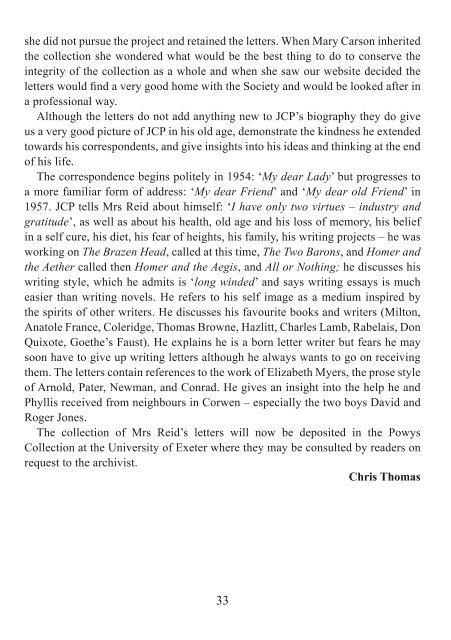Powys Society Newsletter 88
Create successful ePaper yourself
Turn your PDF publications into a flip-book with our unique Google optimized e-Paper software.
she did not pursue the project and retained the letters. When Mary Carson inherited<br />
the collection she wondered what would be the best thing to do to conserve the<br />
integrity of the collection as a whole and when she saw our website decided the<br />
letters would find a very good home with the <strong>Society</strong> and would be looked after in<br />
a professional way.<br />
Although the letters do not add anything new to JCP’s biography they do give<br />
us a very good picture of JCP in his old age, demonstrate the kindness he extended<br />
towards his correspondents, and give insights into his ideas and thinking at the end<br />
of his life.<br />
The correspondence begins politely in 1954: ‘My dear Lady’ but progresses to<br />
a more familiar form of address: ‘My dear Friend’ and ‘My dear old Friend’ in<br />
1957. JCP tells Mrs Reid about himself: ‘I have only two virtues – industry and<br />
gratitude’, as well as about his health, old age and his loss of memory, his belief<br />
in a self cure, his diet, his fear of heights, his family, his writing projects – he was<br />
working on The Brazen Head, called at this time, The Two Barons, and Homer and<br />
the Aether called then Homer and the Aegis, and All or Nothing; he discusses his<br />
writing style, which he admits is ‘long winded’ and says writing essays is much<br />
easier than writing novels. He refers to his self image as a medium inspired by<br />
the spirits of other writers. He discusses his favourite books and writers (Milton,<br />
Anatole France, Coleridge, Thomas Browne, Hazlitt, Charles Lamb, Rabelais, Don<br />
Quixote, Goethe’s Faust). He explains he is a born letter writer but fears he may<br />
soon have to give up writing letters although he always wants to go on receiving<br />
them. The letters contain references to the work of Elizabeth Myers, the prose style<br />
of Arnold, Pater, Newman, and Conrad. He gives an insight into the help he and<br />
Phyllis received from neighbours in Corwen – especially the two boys David and<br />
Roger Jones.<br />
The collection of Mrs Reid’s letters will now be deposited in the <strong>Powys</strong><br />
Collection at the University of Exeter where they may be consulted by readers on<br />
request to the archivist.<br />
Chris Thomas<br />
33


